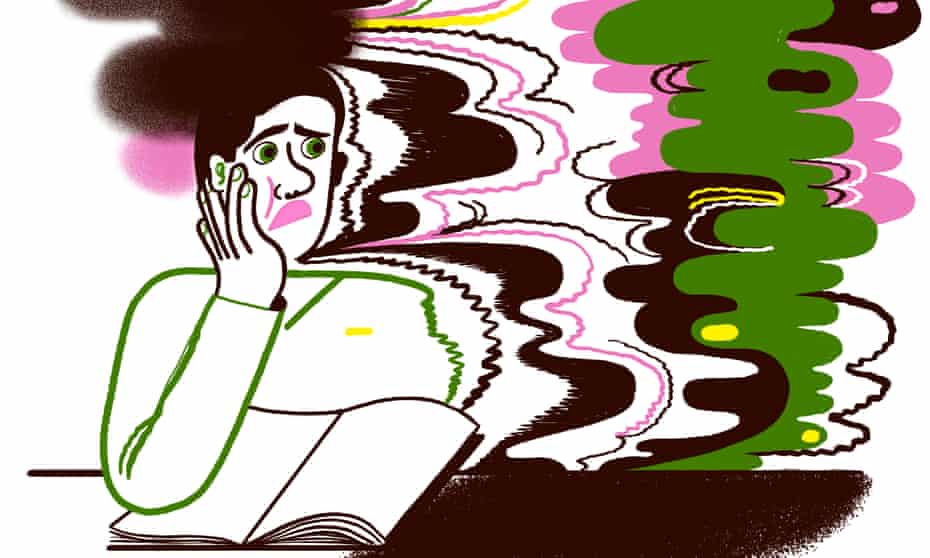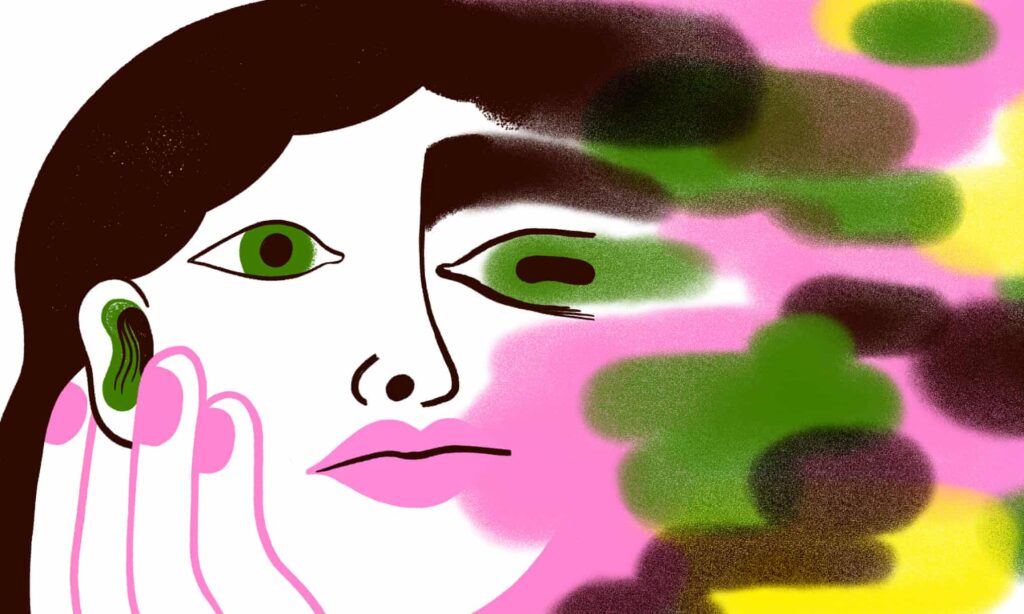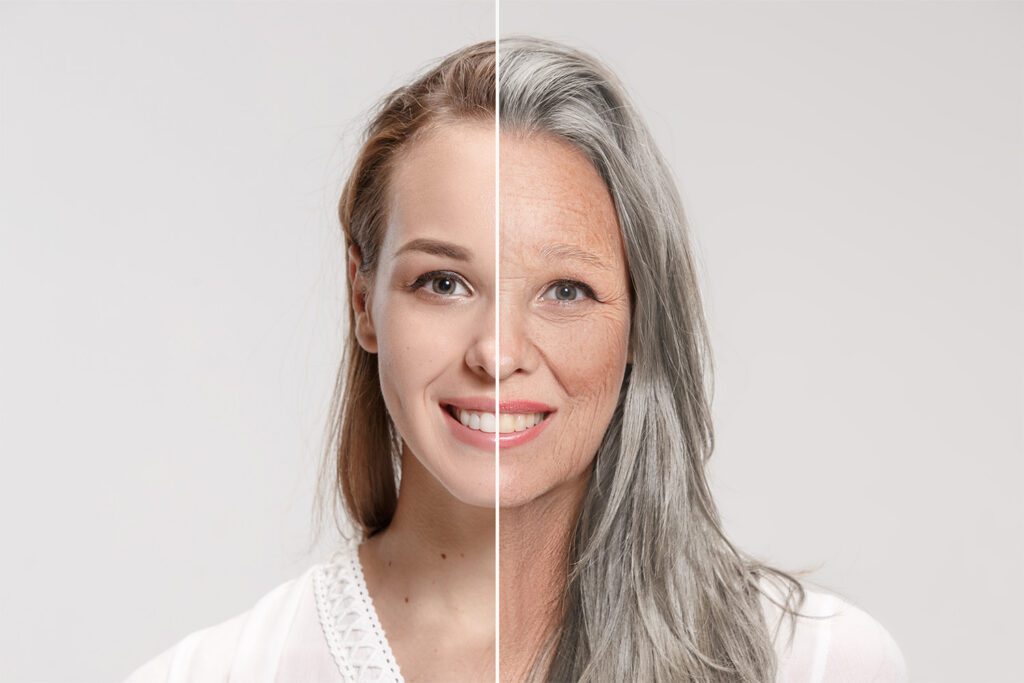After a year of lockdown, many of us are finding it hard to think clearly, or remember what happened when. Neuroscientists and behavioural experts explain why
Before the pandemic, psychoanalyst Josh Cohen’s patients might come into his consulting room, lie down on the couch and talk about the traffic or the weather, or the rude person on the tube. Now they appear on his computer screen and tell him about brain fog. They talk with urgency of feeling unable to concentrate in meetings, to read, to follow intricately plotted television programmes. “There’s this sense of debilitation, of losing ordinary facility with everyday life; a forgetfulness and a kind of deskilling,” says Cohen, author of the self-help book How to Live. What to Do. Although restrictions are now easing across the UK, with greater freedom to circulate and socialise, he says lockdown for many of us has been “a contraction of life, and an almost parallel contraction of mental capacity”.
This dulled, useless state of mind – epitomised by the act of going into a room and then forgetting why we are there – is so boring, so lifeless. But researchers believe it is far more interesting than it feels: even that this common experience can be explained by cutting-edge neuroscience theories, and that studying it could further scientific understanding of the brain and how it changes. I ask Jon Simons, professor of cognitive neuroscience at the University of Cambridge, could it really be something “sciencey”? “Yes, it’s definitely something sciencey – and it’s helpful to understand that this feeling isn’t unusual or weird,” he says. “There isn’t something wrong with us. It’s a completely normal reaction to this quite traumatic experience we’ve collectively had over the last 12 months or so.”
What we call brain fog, Catherine Loveday, professor of cognitive neuroscience at the University of Westminster, calls poor “cognitive function”. That covers “everything from our memory, our attention and our ability to problem-solve to our capacity to be creative. Essentially, it’s thinking.” And recently, she’s heard a lot of complaints about it: “Because I’m a memory scientist, so many people are telling me their memory is really poor, and reporting this cognitive fog,” she says. She knows of only two studies exploring the phenomenon as it relates to lockdown (as opposed to what some people report as a symptom of Covid-19, or long Covid): one from Italy, in which participants subjectively reported these sorts of problems with attention, time perception and organisation; another in Scotland which objectively measured participants’ cognitive function across a range of tasks at particular times during the first lockdown and into the summer. Results showed that people performed worse when lockdown started, but improved as restrictions loosened, with those who continued shielding improving more slowly than those who went out more.
Loveday and Simons are not surprised. Given the isolation and stasis we have had to endure until very recently, these complaints are exactly what they expected – and they provide the opportunity to test their theories as to why such brain fog might come about. There is no one explanation, no single source, Simons says: “There are bound to be a lot of different factors that are coming together, interacting with each other, to cause these memory impairments, attentional deficits and other processing difficulties.”
One powerful factor could be the fact that everything is so samey. Loveday explains that the brain is stimulated by the new, the different, and this is known as the orienting response: “From the minute we’re born – in fact, from before we’re born – when there is a new stimulus, a baby will turn its head towards it. And if as adults we are watching a boring lecture and someone walks into the room, it will stir our brain back into action.”
Most of us are likely to feel that nobody new has walked into our room for quite some time, which might help to explain this sluggish feeling neurologically: “We have effectively evolved to stop paying attention when nothing changes, but to pay particular attention when things do change,” she says. Loveday suggests that if we can attend a work meeting by phone while walking in a park, we might find we are more awake and better able to concentrate, thanks to the changing scenery and the exercise; she is recording some lectures as podcasts, rather than videos, so students can walk while listening. She also suggests spending time in different rooms at home – or if you only have one room, try “changing what the room looks like. I’m not saying redecorate – but you could change the pictures on the walls or move things around for variety, even in the smallest space.”

The blending of one day into the next with no commute, no change of scene, no change of cast, could also have an important impact on the way the brain processes memories, Simons explains. Experiences under lockdown lack “distinctiveness” – a crucial factor in “pattern separation”. This process, which takes place in the hippocampus, at the centre of the brain, allows individual memories to be successfully encoded, ensuring there are few overlapping features, so we can distinguish one memory from another and retrieve them efficiently. The fuggy, confused sensation that many of us will recognise, of not being able to remember whether something happened last week or last month, may well be with us for a while, Simons says: “Our memories are going to be so difficult to differentiate. It’s highly likely that in a year or two, we’re still going to look back on some particular event from this last year and say, when on earth did that happen?”
Perhaps one of the most important features of this period for brain fog has been what Loveday calls the “degraded social interaction” we have endured. “It’s not the same as natural social interaction that we would have,” she says. “Our brains wake up in the presence of other people – being with others is stimulating.” We each have our own optimum level of stimulation – some might feel better able to function in lockdown with less socialising; others are left feeling dozy, deadened. Loveday is investigating the science of how levels of social interaction, among other factors, have affected memory function in lockdown. She also wonders if our alternative to face-to-face communication – platforms such as Zoom – could have an impact on concentration and attention. She theorises – and is conducting a study to explore this – that the lower audio-visual quality could “create a bigger cognitive load for the brain, which has to fill in the gaps, so you have to concentrate much harder.” If this is more cognitively demanding, as she thinks, we could be left feeling foggier, with “less brain space available to actually listen to what people are saying and process it, or to concentrate on anything else.”
Carmine Pariante, professor of biological psychiatry at King’s College London, is also intrigued by brain fog. “It’s a common experience, but it’s very complex,” he says. “I think it is the cognitive equivalent of feeling emotionally distressed; it’s almost the way the brain expresses sadness, beyond the emotion.” He takes a psycho-neuro-immuno-endocrinological approach to the phenomenon – which is even more fascinating than it is difficult to say. He believes we need to think about the mind, the brain, the immune and the hormonal systems to understand the various mental and physical processes that might underlie this lockdown haze, which he sees as a consequence of stress.
We might all agree that the uncertainty of the last year has been quite stressful – more so for some than for others. When our mind appraises a situation as stressful, Pariante explains, our brain immediately transmits the message to our immune and endocrine systems. These systems respond in exactly the same way they did in early humans two million years ago on the African savannah, when stress did not relate to home schooling, but to fear of being eaten by a large animal. The heart beats faster so we can run away, inflammation is initiated by the immune system to protect against bacterial infection in case we are bitten, the hormone cortisol is released to focus our attention on the predator in front of us and nothing else. Studies have demonstrated that a dose of cortisol will lower a person’s attention, concentration and memory for their immediate environment. Pariante explains: “This fog that people feel is just one manifestation of this mechanism. We’ve lost the function of these mechanisms, but they are still there.” Useful for fighting a lion – not for remembering where we put our glasses.
When I have experienced brain fog, I have seen it as a distraction, a kind of laziness, and tried to push through, to force myself to concentrate. But listening to Loveday, Simons and Pariante, I’m starting to think about it differently; perhaps brain fog is a signal we should listen to. “Absolutely, I think it’s exactly that,” says Pariante. “It’s our body and our brain telling us that we’re pushing it too much at the moment. It’s definitely a signal – an alarm bell.” When we hear this alarm, he says, we should stop and ask ourselves, “Why is my brain fog worse today than yesterday?” – and take as much time off as we can, rather than pushing ourselves harder and risking further emotional suffering, and even burnout.
For Cohen, the phenomenon of brain fog is an experience of one of the most disturbing aspects of the unconscious. He talks of Freud’s theory of drives – the idea that we have one force inside us that propels us towards life; another that pulls us towards death. The life drive, Cohen explains, impels us to create, make connections with others, seek “the expansion of life”. The death drive, by contrast, urges “a kind of contraction. It’s a move away from life and into a kind of stasis or entropy”. Lockdown – which, paradoxically, has done so much to preserve life – is like the death drive made lifestyle. With brain fog, he says, we are seeing “an atrophy of liveliness. People are finding themselves to be more sluggish, that their physical and mental weight is somehow heavier, it’s hard to carry around – to drag.” Freud has a word for this: trägheit – translated as a “sluggishness”, but which Cohen says literally translates as “draggyness”. We could understand brain fog as an encounter with our death drive – with the part of us which, in Cohen’s words, is “going in the opposite direction of awareness and sparkiness, and in the direction of inanimacy and shutting down”.
This brings to mind another psychoanalyst: Wilfred Bion. He theorised that we have – at some moments – a will to know something about ourselves and our lives, even when that knowledge is profoundly painful. This, he called being in “K”. But there is also a powerful will not to know, a wish to defend against this awareness so that we can continue to live cosseted by lies; this is to be in “–K” (spoken as “minus K”). I wonder if the pandemic has been a reality some of us feel is too horrific to bear. The uncertainty, the deaths, the trauma, the precarity; perhaps we have unconsciously chosen to live in the misty, murky brain fog of –K rather than to face, to suffer, the true pain and horror of our situation. Perhaps we are having problems with our thinking because the truth of the experience, for many of us, is simply unthinkable.
I ask Simons if, after the pandemic, he thinks the structure of our brains will look different on a brain scan: “Probably not,” he says. For some of us, brain fog will be a temporary state, and will clear as we begin to live more varied lives. But, he says, “It’s possible for some people – and we are particularly concerned about older adults – that where there is natural neurological decline, it will be accelerated.”
Simons and a team of colleagues are running a study to investigate the impact of lockdown on memory in people aged over 65 – participants from a memory study that took place shortly before the pandemic, who have now agreed to sit the same tests a year on, and answer questions about life in the interim. One aim of this study is to test the hypothesis of cognitive reserve – the idea that having a rich and varied social life, filled with intellectual stimulation, challenging, novel experiences and fulfilling relationships, might help to keep the brain stimulated and protect against age-related cognitive decline. Simons’ advice to us all is to get out into the world, to have as rich and varied experiences and interactions as we can, to maximise our cognitive reserve within the remaining restrictions. The more we do, the more the brain fog should clear, he says: “We all experience grief, times in our lives where we feel like we can’t function at all,” he says. “These things are mercifully temporary, and we do recover.”
Read the original article here











